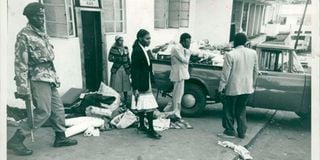The six hours that changed Kenya in 1982

Police officers guard looted property recovered from a lodging in Kirinyaga Road, Nairobi, following the failed coup attempt on August 1, 1982.
On August 1, 1982, Nairobi woke up to the sound of gunfire, combat jets, and explosions. At the Voice of Kenya studios, members of the Kenya People’s Redemption Council were live on air.
At 6am, Senior Private Hezekiah Ochuka and Sergeant Pancras Oteyo Okumu captured the Voice of Kenya radio station, from where they then broadcast in English and Swahili that the military had overthrown the government.
About a month earlier in late July 1982, Ochuka had held a secret meeting at football grounds near Umoja estate and details of how the coup was to be executed were discussed. During this meeting, Ochuka told the attendees that he had the support of Uganda, Tanzania and Sudan who would send their soldiers to the borders to counter any opposition.
He went further to allege that he had the blessings of Russia who would send a Soviet ship to the Kenyan coast to guide him against any external interference. Ochuka had made up all these stories to convince his recruits to take up the risk in the mission.
Ochuka, whose rank of Senior Private Grade-I was the second lowest rank in the military, claimed to rule Kenya for about six hours after the attempted coup, before fleeing to Tanzania. After being extradited back to Kenya, he was tried and found guilty of leading the coup attempt and was hanged in 1987.
The coup left more than 100 soldiers and perhaps 200 civilians dead, including several non-Kenyans. After the failed coup, the organisers were arrested and tried by court martial at the Army’s Lang’ata Barracks.
The events of 40 years ago still live on in the memories of those who experienced them. You can re-live the drama and uncertainty of those few days in August 1982 by listening to this compilation of recordings, made in Nairobi at the time.
They include the radio statements by the rebels, the other radio announcements after the recapture of the VOK buildings, analysis of the attempted coup by the BBC World Service and Radio RSA, gunfire in the streets outside Starehe compound, and the sound of military jets flying over the city.
President Moi can be heard addressing the nation after order was restored, though even after his broadcast, shooting was heard in the streets of Nairobi. Imagine the scenario, and think how you would feel, not knowing what information to believe, and which group really held sway.
These recordings are shared for posterity and for educational purposes. You can access them through Sparrowdudu on YouTube. Long Live Kenya!
Matthew Watters, Nairobi




